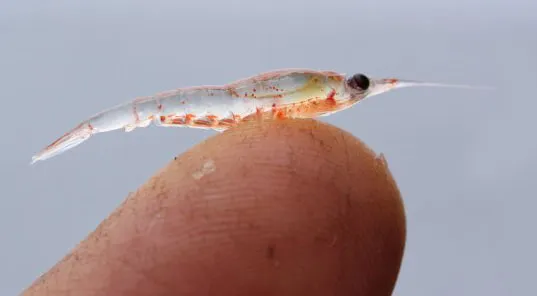Krill, those tiny members of the ocean's planktonic community, have an importance disproportionate to their size. They are a vital food for whales, penguins and increasingly, humans. Demand for krill-based animal feed and 0mega-3 fatty acids is leading to a "gold rush" in the Southern Ocean off Antarctica.
Harvesting krill is the outcome of a decades-long trend of "fishing down the food web". After humans decimated large oceanic organisms like tuna and swordfish, global fisheries have turned to smaller and less desirable species. Lobster, for instance, was once fed to prisoners, while cod was once so plentiful it was used as fertilizer. Now, fisheries are increasingly snapping up 'bait fish' like anchovies, mackerel and menhaden. The fact that commercial fishermen are now turning to krill, even jellyfish, indicates we may be scooping up the last and least tasty fish in the sea.
'Fishing down the food web' isn't limited to marine environments. Humans began 'hunting down the food web' as soon as we had weapons and tactics sophisticated enough to bring down a mammoth. Our hunter-gather ancestors went after protein sources that would return the most reward for the smallest investment. If the Pleistocene extinctions are anything to go by, early humans' preference for large herbivores like mammoths may have driven them to their extinction.

Though humanity consumes staggering quantities of large domestic mammals like pigs and cows, it doesn't mean that we're not actively looking for the terrestrial equivalent of krill. The UN has recommended research into bug-based food sources, which can be up to five times as efficient as mammalian meat, to solve the developing world's protein crisis. Companies are springing up that market bug nuggets and muesli. Lab-grown meat, which doesn't even need a whole, living animal, can be thought of another manifestation of the race to the bottom.
There's no doubt that the more efficient production of protein is essential: less carbon, less water waste, less habitat loss. But however admirable the benefits, the only reason we're turning to plankton and petri dishes is out of necessity. Though seafood is the last commercially viable wild food, the fact that we're scraping the bottom of the fisheries barrel indicates we're nearing the end. 'Feeding down the food web' is coming to the logical conclusion of a 11,000 year old trend. Technology has triumphed, but for anyone who enjoys their protein big, wild, and with a backbone, the days of steak and plenty are over.
Photo via Upwelling.


Comments (0)
Share your thoughts and join the technology debate!
No comments yet
Be the first to share your thoughts!